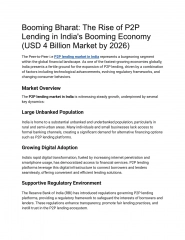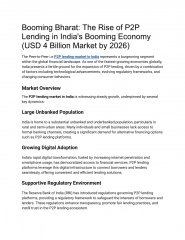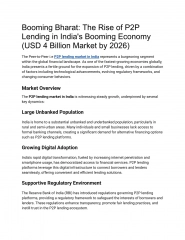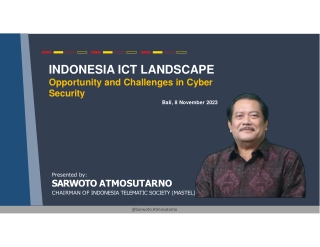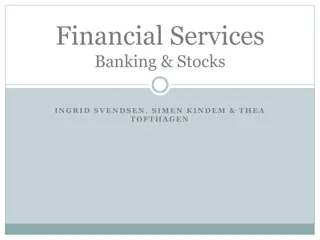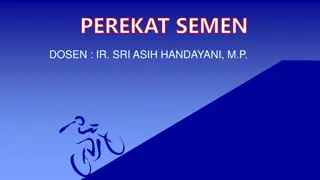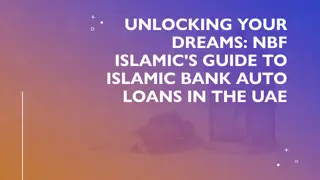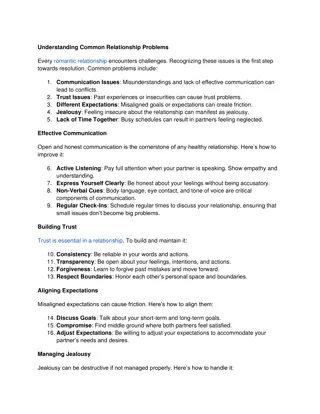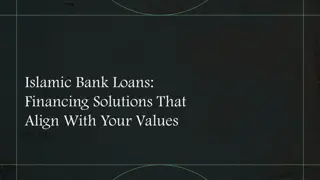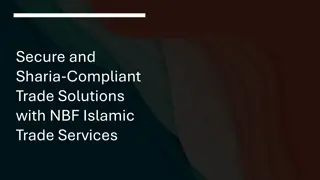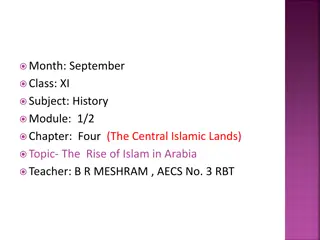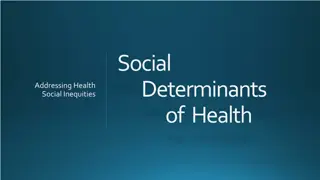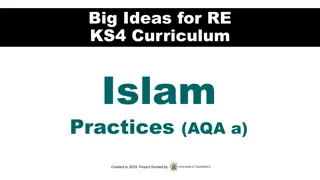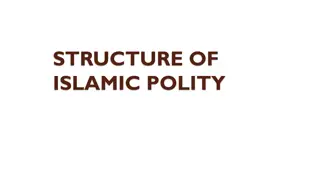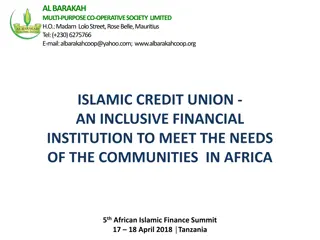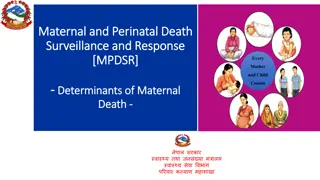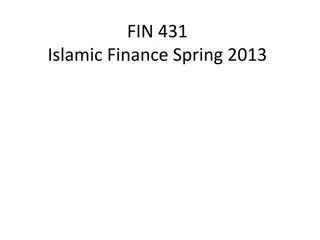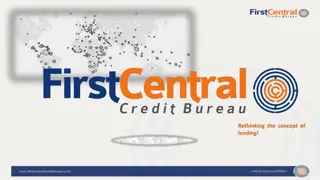Determinants of Islamic Peer-to-Peer Lending Default in Indonesia
Research explores the impact of COVID-19 on Islamic P2P lending default rates in Indonesia and identifies contributing factors. It investigates how green Sukuk can address environmental risks and analyzes the behavior of Indonesian stock indices during the pandemic.
Download Presentation

Please find below an Image/Link to download the presentation.
The content on the website is provided AS IS for your information and personal use only. It may not be sold, licensed, or shared on other websites without obtaining consent from the author.If you encounter any issues during the download, it is possible that the publisher has removed the file from their server.
You are allowed to download the files provided on this website for personal or commercial use, subject to the condition that they are used lawfully. All files are the property of their respective owners.
The content on the website is provided AS IS for your information and personal use only. It may not be sold, licensed, or shared on other websites without obtaining consent from the author.
E N D
Presentation Transcript
Expectation Elements of Empirical Good Papers Discussion: 73 Research topics Writing introduction
EXPECTATION: Submission > 200 Writing skill is a long journey and we are taking initial steps commitment and ready to work hard Adhering to deadline Persistence in Reading this is key to many in writing a journal article Focus is on writing. However, I would be able to advise if the research falls under my areas of expertise and employs econometric modelling (I do not know everything). Start from scratch. You may refer to the content of what you have submitted (e.g. thesis or long writeup) but do not look at the way to have written. > 90 1stScreen >70 2ndScreen Key: Research hypothesis is clear or can be developed.
Research Objectives Motivation Contributions Gaps Appropriate Intuition Robustness Initial Questions: Are the hypotheses clear and stated explicitly? What are theoretical bases for the hypotheses? Are hypotheses measurable? Are data available and sufficient? Do they have practical and/or academic relevance? Contribution? Methods /Results Introduction Literature Review Writing Familiarity State of Knowledge Gaps Flow Neatness Absence of Mistakes
Research objective must be explicitly and clearly stated Examples Hypothesis: A statement of expectation or prediction to be tested, normally involving relations between variables. It is normally stated as the research objective Examples This research aims to see how the performance of Islamic banking and conventional banking compares during the Covid 19 pandemic To Analyze the Effect of Sharia Financial Index on Macroeconomics and Poverty This research aims to provide empirical evidence that various types of bank support have an influence on SME export performance, particularly halal food and Moslem fashion industry. To investigate the borrowers characteristics that have an impact on the default risk in Islamic peer to peer lending during covid-19 crisis Measuring financial performance of Indonesia Islamic Banking during Covid-19 outbreak Finding factors impact to financial performance of Indonesia Islamic Banking during Covid-19 outbreak COVID-19 and stock market performance
HYPOTHESES AND DATA QUESTIONS FOR EMPIRICAL RESEARCH: ARE THERE MEASUREMENTS? Measurability Availability ARE THERE HYPOTHESES TO BE TESTED? ARE GENERALIZATION TO BE MADE? Sufficiency
No. 01 Title (Author) Determinants of Islamic peer to peer lending default in the covid-19 crisis: Evidence from Indonesia (Dety Nurfadilah) Twin deficits, sukuk and energy sector in Indonesia (Nursechafia) Green Sukuk in Mitigating Environmental Risk (Jumansyah) The Behavior of Indonesian Stock Indices during the COVID-19 Pandemic Crisis: Conventional, Sharia, and SRI in Comparison (Nur Hidayah) Covid-19 and the Islamic Equity Market Reaction in the Largest Muslims Countries (Budi Setiawan) The Impact of Covid-19 Outbreak on Stock Market in Indonesia (Rr Tini Anggraeni) The Agriculture Stocks and Covid-19 Pandemic; Evidence from the Indonesian Sharia Stock Index (Mashilal, M.Si) Hypotheses Characteristics of Loans, Borrowers, Macroeconomy, and institutional investors Macro conditions, sukuk and energy Twin deficits Green Sukuk Environmental risk Data Secondary 02 Secondary 03 Secondary 04 Secondary Clear objective. However, Will the scope be sufficient? 05 Secondary 06 Secondary 07 Secondary
No. 08 Title (Author) The Interest of Millennial Investors to Invest in The Islamic Capital Market During The Covid 19 Pandemic (Surepno) Hypotheses Can a hypothesis be developed? Data Primary 09 Policy Evaluation of Mandatory Spin-offs of Indonesia Islamic Banking Windows: A Case Study in Islamic Windows of Regional Banks (Ziyan Muhammad Farhan Intan Natasha Putri) Effectivity policies and financial performance of Islamic banking during covid-19 outbreak in Indonesia (Ade Chandra) Optimizing Financing Portfolio of Islamic Bank for Challenging COVID-19: Is Optimal Financing Portfolio Determining Financial Stability? (Ainun Zamilah) Board Characteristics and Political Connectedness of Islamic Banks: Empirical Evidence of Indonesian and Malaysian Islamic Banks (Annisa Rizkia Syaputri) Policy evaluation? Secondary Hypothesis? 10 Secondary 11 Secondary 12 Secondary
No. 13 Title (Author) Is the covid-19 pandemic crisis affect Islamic and conventional banks financial performance in Indonesia? (Nur Azifah) Corporate Ethical Identity and Earnings Quality: Evidence from Islamic Banks in QISMUT+3 Countries (Ulfa Rahmawati) Effect of ethical behavior in marketing on the satisfaction of sharia bank customers (Muhammad Kamal Zubair) Intention to Deposit in Islamic Banks: Analysis of Religiosity and Profitability (Dewi Fatmawati) Technology diffusion in islamic banking: A case of electronic banking services in Indonesia (Achmad Hidayat) Islamic Banking Financing in Indonesia: A Cross-Provinces Analysis (Faizul Mubarok) Sharia and Conventional Banking in Indonesia: Resilience, Performance, and Innovation during the COVID-19 Pandemic (Jaharuddin) Credit Risk and SMEs in Indonesian Islamic Banks versus Conventional Banks: A Dynamic Panel Analysis (Faizah Syihab) Hypotheses Data Secondary 14 Secondary 15 Primary 16 Primary 17 Primary 18 Secondary 19 Primary 20 Secondary
No. 21 Title (Author) Is it Necessary to Improve the Working Capital Financing and Investment by Sharia Banking to MSMEs? (Sri Maulida) Factors Influence Non-Muslims In Taking Home Ownership Financing in Islamic Banks (Atiqi Chollisni) Pengaruh karakteristik dan tata kelola bank terhadap laju pengembalian investasi di bprs (Rozaq M. Yasin) Proyeksi stabilitas jangka pendek dan jagka panjang pada perbankan syariah di indonesia periode covid-19 menggunakan pendekatan panel ardl (M. Fikri Himmawan) Islamic banks credit risk performance for home financing: Before and during Covid-19 pandemic (Faaza Fakhrunnas) Intellectual capital efficiency to the business and social performance of sharia banks(Indonesia) (Novi Wardi) The effect of improving the quality of human resources and profitability on company value with good corporate governance as a moderating variables (study on sharia commercial banks in Indonesia) (Muhlis) Hypotheses Data Secondary 22 Primary 23 Secondary 24 Secondary 25 Secondary 26 Secondary 27 Secondary
No. 28 Title (Author) Sharia Bank And Conventional Bank During Covid 19 Pandemic (Studies On Banking In Indonesia) (Rizki) Shariah supervisory board and financial performance, does the tenure matter? (Hasan Mukhibad) Analysis of influencing factors Collection of mudharabah deposits on Sharia banking in Indonesia (Isra Hayati) Hypotheses Data Secondary 29 Secondary 30 Secondary 31 Transmission of conventional and sharia monetary policies on inflation control in indonesia in 2012-2020 (Dr. Binti Nur Asiyah, M.Si.) Sharia financial digitalization model: promoting growth inclusivity and economic equality (Feri Dwi Riyanto) Stable Coin, Cryptocurrency and Other Payment Innovations: Opportunities, Risks, and Policy Implementations for Indonesia Economic (Patria Yunita) Research ini akan meneliti bagaimana pengaruh inflasi yang terjadi di Indonesia serta optimalisasi peran peningkatan ekspor terhadap terhadap perekonomian nasional. (Purbawati Setyaningsih) Secondary 32 Secondary 33 Secondary 34 Secondary
No. 35 36 Title (Author) Determinan stabilitas sistem keuangan (Qonitat Az - Zahra ) Analysis of Islamic Economic-Financial Literacy and Its Impact on Investment Sharia Decisions in Indonesia (Anisa Ilmia) Electronic money, card-based payment Instruments, and monetary policies: Indonesian experience (Pribawa E Pantas) Islamic financial development and income inequality in Indonesia (Azwar Iskandar) Determining the nexus between Islamic financial inclusion and economic growth in OIC developing countries (Sulaeman) Hypotheses Data Secondary Primary 37 Secondary 38 Secondary 39 Secondary 40 Adoption of syariah insurance in indonesia: theory diffusion of innovation (Nurul) Determinan pengembangan wakaf uang dan implikasinya (Jaharuddin) Analisis dampak kualitas pelayanan, reputasi merek dan kemudahan penggunaan terhadap kepuasan wakif dalam pelayanan lembaga wakaf (Muhammad Wicaksono Hasdyani Putra) Primary 41 Primary 42 Primary
No. 43 Title (Author) Literacy index of waqf, perception of cash waqf as a moderation of desires of cash waqf (studies on west java society) (Husnul Khatimah) Factors Determining Muslim Behavioral Intention to Participate in Waqf Mushtarak (Lu'liyatul Mutmainah) Factors Affecting Intention to Do Cash Waqf (Popy Novita Pasaribu) Determinant Financial Practices in the Baitul Maal Wat Tamwil and Islamic Banking in Indonesia: Case study on Waqf Contract (Rahmawati) Does Financial Technology Improve Muslim's Participation in Zakat During Pandemic Covid-19?: An Extended UTAUT2 Approach (Izra Berakon) This research contributes to providing new insights regarding the factors that influence consumers in using e-zakah (Ravika Mutiara Savitrah) Hypotheses Data Primary 44 Primary 45 Primary 46 Secondary 47 Primary 48 Primary
No. 49 Title (Author) Analysis of amil zakat institution readiness in facing the digital era (Siti Nur Rosifah) Hypotheses Data Primary 50 Implementasi Islamic Wealth Management terhadap Keberdayaan Perempuan di Masa Pandemi Covid-19 (Aas Nurasyiah) Islamic Pension Fund Literacy: What Drives Customers on Having Islamic Pension Fund in Indonesia (andri soemitra) Relationship Between Age and Happiness: The Role of Expenditure and Education (Rakhmawati) The effect of application of tauhid-based accounting behavior to avoid tax practice in Indonesia (Dwi Koerniawati) The role of islamic social finance toward overcoming poverty problems on covid-19 pandemics (Muhammad Iqbal Fasa) Savings-investment behaviour towards hajj pilgrimage Among youth (Fitri Hastuti) Primary 51 Primary 52 Secondary 53 Secondary 54 Primary 55 Primary
No. 56 Title (Author) Fostering Export for Halal Food and Moslem Fashion (Masruri Muchtar) Tarif Bea Masuk Dalam Perspektif Ekonomi Islam dan Pengaruhnya Terhadap Kesejahteraan (Herlitah) How Social Media Influencer Forming Muslim Consumer s Halal Cosmetics Purchase Intention: Religiosity Concern (Indri Supriani) Apakah Implementasi Nilai Maqashid Syariah dapat Mencegah Terjadinya Kejahatan Siber pada Pengguna E-Money di Indonesia? (Irma Yuliani) Circular economy and islamic microfinance: Cultural, outreach and efficiency (PURWANTO) Determinants Variables that Related to Tourism in ASEAN-5 and Several Asia Countries (Dr. Sutikno, SE., ME.) Adoption of Halal Marketplace by Consumer in Indonesia (Sarah Fadilla) Hypotheses Data Primary 57 Secondary 58 Primary 59 Primary 60 Secondary 61 Secondary 62 Primary
No. 63 Title (Author) Pengaruh Human Capital dan Kesadaran Halal Untuk Menjadi Halalpreneurs (Dwi Nur'aini Ihsan) Understanding halal brand purchase intention: the effect of islamic branding, halal awareness and trust (Dr. Hj. Anita Rahmawaty, M.Ag.) Recovery after pandemic: achieving sustainable redistribution With financial inclusion and digitalisation msme s (RIRIS AISHAH PRASETYOWATI) Does determinants loyalty and word of mouth about M-commerce among muslim consumer?: Evidence from Indonesia (Saiful Anwar) Socio-Religious Contribution to the Food Security Strengthening of Households: Evidence from South Sulawesi, Indonesia (Syaparuddin Razak) The effect of factor of the amount of regional income and quality of environment on the level of poverty in indonesia in maqashid syari ah point of view (Cut Dian Fitri) Hypotheses Data Primary 64 Primary 65 Secondary 66 Primary 67 Primary 68 Secondary
No. 69 Title (Author) Behavior approach to acceptance e-marketing for msme enterprises for improving the performance of msme in the period and post-pandemic (Fetria Eka Yudiana) Untuk Mengetahui Pengaruh Financing to Deposit Ratio (FDR) terhadap Kinerja Keuangan Bank Umum Syariah (BUS) Badan Usaha Milik Negara (BUMN) di Indonesia. (Dr. Early Ridho Kismawadi, MA) The Role of Islamic Financial Technology to Financial Inclusion in Indonesia (Eko Fajar Cahyono) Hypotheses Data Primary 70 Many focuses (from thesis) Secondary 71 Secondary
Writing Introduction Any discussion in practices? Theoretical foundations OBJECTIVES RESEARCH Existing empirical evidence Relevant statistics Contributions? The sample/subject of the study: why?
Writing Introduction Kotze (2007) 1. Statement of topic of study 2. Academic/Practical Importance 3. Summary of Literature 4. Gaps, Controversies, Inconsistencies 5. Research Objectives and Context 6. Outline Topic Issues Attention Purposes Elements
THANK YOU Q & A Session


